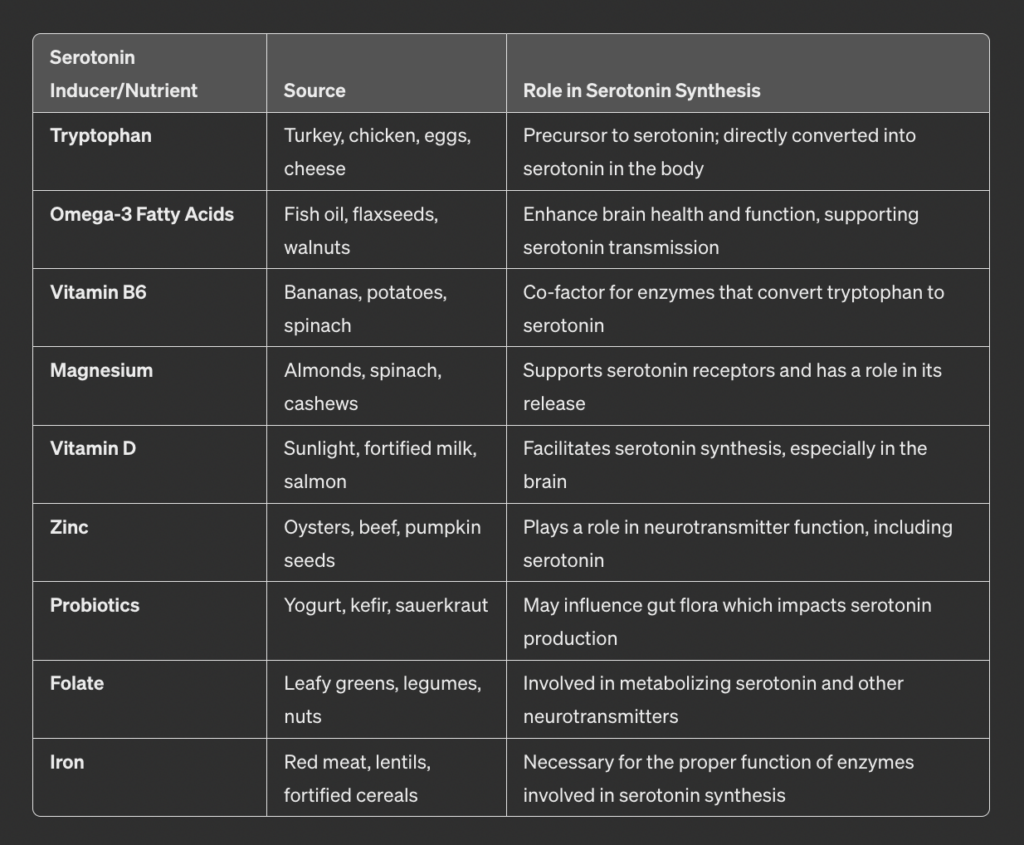What's On This Page?
ToggleWhen we think about mood regulation, self-esteem, and overall mental health, our brain often gets all the credit. However, there’s another surprisingly influential player… our gut! And there’s a gut-brain axis that acts like a superhighway.
Indeed, it might shock some to learn that the majority of serotonin, a key neurotransmitter often called the “feel-good hormone,” is actually produced NOT in the brain but in your gut. Let’s delve into how this neurotransmitter is synthesized in the gastrointestinal tract, why it primarily occurs there, and how it manages to impact our brain functions, influencing mood, anxiety levels, and even our self-esteem.
Before I forget, you may be interested in reading another article after this one, How Your Mental Health Is Affected By Homocysteine, Serotonin And Interleukin-8.
A Brief Overview
Before we explore the gut-brain connection, it’s crucial to understand what serotonin is and what it does. It is a neurotransmitter, a type of chemical messenger that helps transmit signals in the brain and other areas of the body. It plays a role in many functions, including mood regulation, sleep, appetite, and bowel transit time.
Typically, when people experience feelings of well-being and happiness, serotonin levels are stable and sufficient. You can eat foods high in the amino acid L-tryptophan (which helps create it), or you can take drugs like SSRIs that make the serotonin you have lying around work longer!
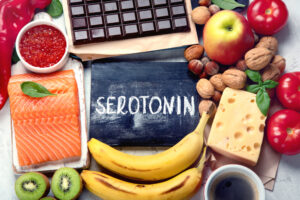
Serotonin Synthesis: A Gut Feeling
Contrary to popular belief, up to 90% of the body’s serotonin is produced in the gastrointestinal (GI) tract. Here’s how it happens:
- Biosynthesis:
- The neurotransmitter is synthesized from the amino acid tryptophan, which we ingest through our diet. Foods rich in tryptophan include turkey, nuts, and cheese.
- Once absorbed, tryptophan is converted into 5-hydroxytryptophan (5-HTP) by the enzyme tryptophan hydroxylase, and then 5-HTP is converted into serotonin.
- Role of the Gut:
- The GI tract is lined with a vast number of neurons that manage gut function, often referred to as the “enteric nervous system.” This system is so extensive it’s sometimes called the second brain.
- The enterochromaffin cells in the gut mucosa play a crucial role in synthesis. Once produced, serotonin acts locally to regulate bowel movements and function. Insufficient levels can lead to slower motility, which means the intestines don’t contract as they should. This slowdown can lead to constipation, suggesting that adequate serotonin levels keep things moving regularly.
It Doesn’t Get Into Your Brain
Serotonin that is produced by the enterochromaffin cells in our GI tract does not cross into the brain. This is because it cannot cross the blood-brain barrier, which is a selective barrier designed to protect the brain from pathogens and regulate the transport of substances into and out of the brain. Therefore, the serotonin that acts within the brain has to be made in there from precursors (like tryptophan) that have already crossed into the brain (having got past the blood-brain barrier).
Inside the brain, the synthesis of this neurotransmitter takes place in the pineal gland. You probably recognize this gland as the one that also makes melatonin to help you sleep at night. The melatonin is just serotonin broken down!
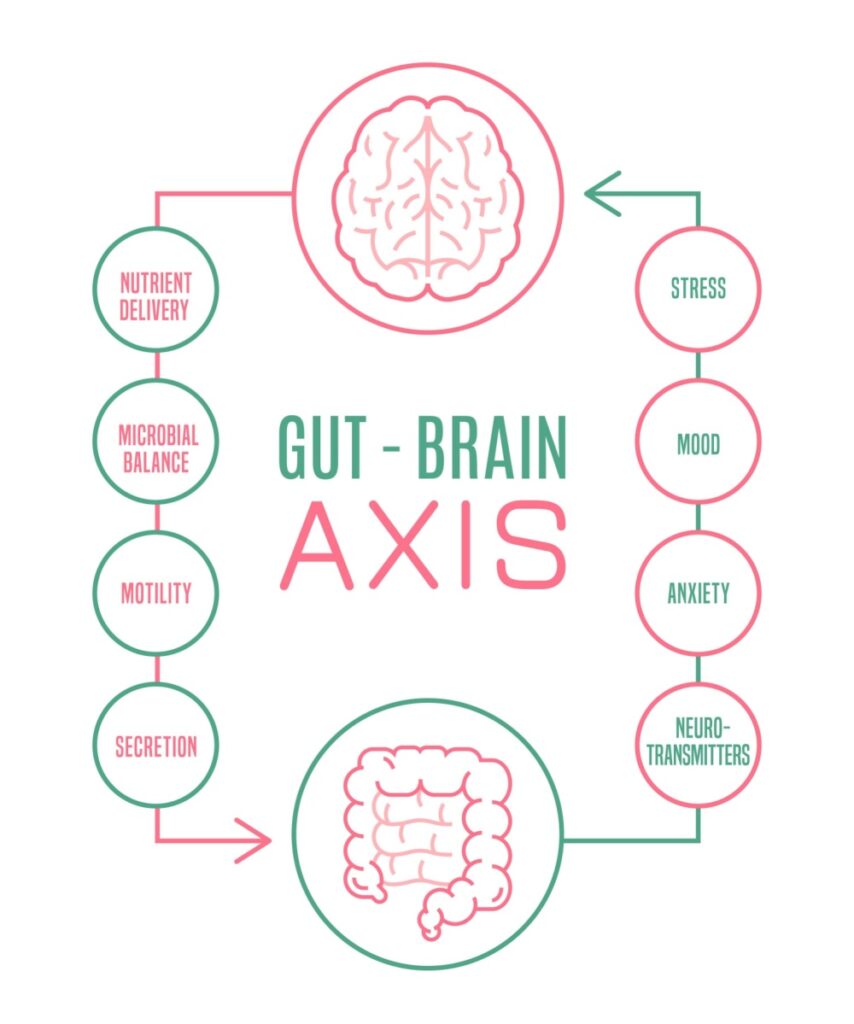
The Gut-Brain Axis: A Two-Way Communication System
The link between low serotonin levels and an increased risk of suicide has been well-documented. Serotonin helps to regulate mood, aggression, and impulse control, all of which can be factors in suicidal thoughts and behaviors. But as I mentioned, almost all of it is made in the gut, so how does it impact brain and mood?
It has significant effects on the brain thanks to the gut-brain axis, a complex network of direct and indirect pathways between the cognitive and emotional centers of the brain and peripheral intestinal functions. Here’s how this connection works – I’m going to explain the image above that says “Gut-Brain Axis.” I’m going to describe the graphic above now.
Imagine your gut and brain are like old friends chatting over a cup of tea, sharing stories and influencing each other’s feelings. The graphic you’re seeing is essentially an illustration of that intimate conversation. It’s a snapshot of how our gut health can whisper secrets to our brain, impacting our emotions and psychological well-being.
At the top, we have our noggin – the control center of the body – where all the thinking, feeling, and planning happens. But it doesn’t act alone. There’s a loop, a sort of feedback system, connecting it to the gut down below. It’s a two-way street: Just as our brain can send butterflies to our stomach when we’re nervous, our gut sends back its own signals.
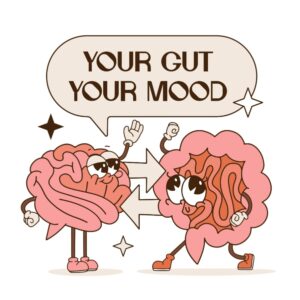
Now, let’s break down this graphic:
- Stress: Stress acts like the brain’s alarm system. When you are upset or angry, it can actually upset your stomach. Ever had a “gut-wrenching” feeling? That’s your brain and gut gossiping about stress! Chronic stress leads to more mid-section fat.
- Mood: This is like the brain’s weather report. Sunny skies vs. hurricanes in our mind can affect the environment in our gut.
- Anxiety: Think of it as the brain’s worrisome voice, which can echo in the gut, causing a bit of a stir down there.
- Neurotransmitters: These are the brain’s text messages to the body, telling it how to feel and react. Serotonin is one of these messages that’s mostly made in the gut – it’s like a group text for well-being.
Swinging down to the gut, it’s a hub of activity:
- Secretion: This is the gut’s way of producing substances like digestive juices and, yes, serotonin – it’s like the gut’s own little chemistry set.
- Motility: The gut’s rhythm of moving food along. It’s like a dance floor where the moves depend on the music the brain is playing. If you’re constipated, you’re holding on to toxins too long. With diarrhea, you don’t absorb them well.
- Microbial Balance: This refers to the friendly bacteria throwing a party in our intestines. They’re pretty good at maintaining balance and contributing to the mood music. Opportunistic, pathogenic bugs ruin the party.
- Nutrient Delivery: It’s the gut’s food delivery service, ensuring our body and brain get the nutrients they need to keep the conversation going. Sometimes BETAINE helps, sometimes not. Acid blockers block nutrient delivery!
This graphic above captures the essence of this “conversation” which is a complicated, bidirectional relationship where our gastrointestinal tract can mirror, or maybe reflect is a better word, our brain’s state, and vice versa. Keeping this communication clear and positive can mean a happier, healthier life. At least in both mind and body. So, if we take care of our gut flora and nourish it, it’s like sending a love letter to our brain, and who wouldn’t want that?!
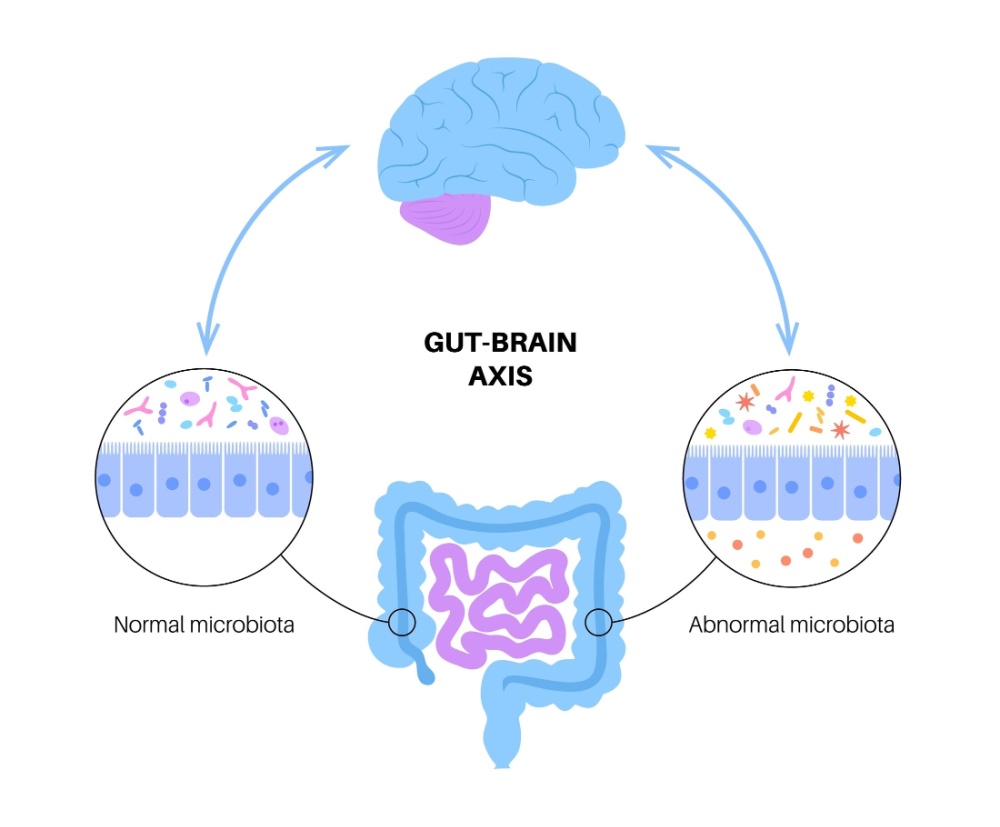
Implications for Mood and Self-Esteem
Given this intricate interplay, fluctuations in serotonin levels can directly influence our emotional state. Here’s why:
- Mood Regulation: Sufficient serotonin levels in the brain are crucial for feeling calm, happy, and emotionally stable. Disturbances in serotonin production or signaling can lead to mood disorders such as depression and anxiety.
- Self-Esteem: Serotonin’s impact on mood can also affect one’s self-esteem. Feeling good biochemically can translate to feeling valuable and confident. The neurobiology of how serotonin impacts your ability to be patient is discussed in this ARTICLE.
The following graphic lists the holistic remedy with its food sources, as well as the role it plays in serotonin synthesis.
Serotonin-Building Nutrients
5 Ways to Increase Serotonin Production or Improve Receptor Activity
Here are some effective strategies for boosting levels and enhancing serotonin receptor sensitivity:
- Increase Tryptophan Intake
- Consuming foods rich in tryptophan, the precursor to serotonin, can help increase your brain’s levels. Include foods like turkey, eggs, cheese, nuts, and seeds in your diet.
- Exercise Regularly
- Physical activity can boost your brain’s serotonin levels and increase receptor sensitivity. Regular exercise, especially aerobic exercises like running, cycling, and swimming, is beneficial.
- Get Plenty of Natural Light
- Exposure to sunlight increases the rate of serotonin production. Try to get at least 20-30 minutes of sunlight exposure daily. This can also help regulate your circadian rhythms, improving sleep and mood.
- Manage Stress
- Chronic stress is known to deplete serotonin levels. Engaging in stress management techniques such as mindfulness, meditation, or yoga can help maintain healthy levels and enhance receptor function.
- Consider Probiotics
- Since the gut microbiome can influence production, taking probiotics may help improve the health of your gut flora, potentially boosting serotonin production. Foods rich in probiotics like yogurt, sauerkraut, and kefir or probiotic supplements can be beneficial.
Improving Receptor Activity
- Omega-3 Fatty Acids: These are believed to help increase the fluidity of brain cell membranes, thus possibly making serotonin receptors more accessible and responsive. Foods rich in omega-3s include fish like salmon and sardines, as well as flaxseeds and walnuts.
- Mindful Meditation: Regular meditation has been shown in some studies to change brain regions associated with serotonin transmission, potentially increasing receptor sensitivity and effectiveness.
By adopting these strategies, not only can you potentially raise your serotonin levels but also enhance the way your body utilizes this essential neurotransmitter, leading to better mood regulation and overall well-being.
Summary
Understanding the role of the gut in serotonin production opens up new avenues for managing mood and enhancing self-esteem. By nurturing our gut health through diet, exercise, and proper stress management, we can potentially influence our brain’s biochemical landscape, promoting a happier, healthier mental state. As we continue to unravel the mysteries of the gut-brain axis, the adage “trust your gut” gains a whole new, scientifically-backed significance.

Suzy Cohen, has been a licensed pharmacist for over 30 years and believes the best approach to chronic illness is a combination of natural medicine and conventional. She founded her own dietary supplement company specializing in custom-formulas, some of which have patents. With a special focus on functional medicine, thyroid health and drug nutrient depletion, Suzy is the author of several related books including Thyroid Healthy, Drug Muggers, Diabetes Without Drugs, and a nationally syndicated column.

